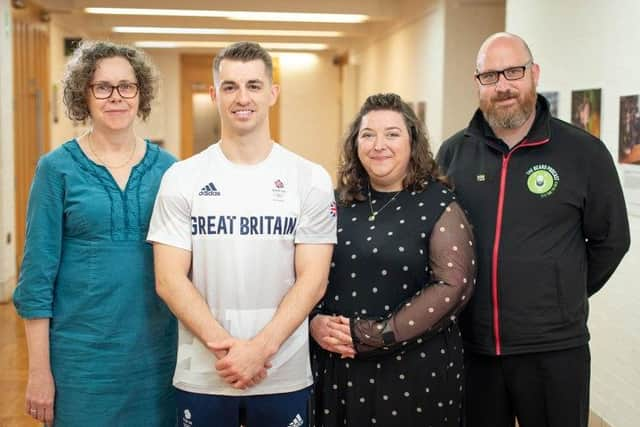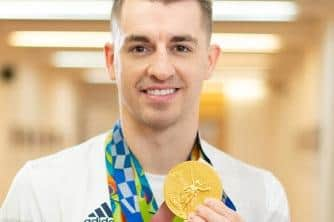Olympic gymnast Max Whitlock in Hull: 'I felt like a waste of space after Tokyo'
As part of the University of Hull’s six-year partnership with Team GB, ambassador Whitlock last week appeared on stage at the campus with second-year Sports Coaching and Performance Science student Nick Minns, who runs The Beard Podcast on mental health, and Professor Jacquie White, a registered mental health nurse. Kelly Robson, Deputy Head of Student Support and Experience, and presenter Kofi Smiles, among others, joined the discussion.
The conversation around psychological and emotional wellbeing is one that has grown in recent years, with the latest Mental Health Awareness Week taking place just last week.
Advertisement
Hide AdAdvertisement
Hide AdAfter the last Olympics, Whitlock had hit all his targets but “not long after that felt like a complete failure, waste of space and pretty useless,” he says over Zoom to The Yorkshire Post


“If I felt like that after achieving a gold medal, it kind of just shows how common it is and how okay it is to feel like that,” says the 30-year-old athlete, of Essex, after the campus event. “That's the kind of feedback that I've had. I think that's why it was really important for me to talk out, to be that open and that honest, because I think it can help a lot of people.
“I felt like I just would never be that person that ever falls into that rut and actually, before I knew it, everything came crumbling down and hit me like a tonne of bricks and there was kind of no warning. I think that was the hardest thing.”
At London 2012, then aged 19, Whitlock came away with two bronze medals – in the team competition and pommel horse - despite having not even competed in a World Championships at that point.
Advertisement
Hide AdAdvertisement
Hide AdFour years later in Rio, he became the first British gymnast to win Olympic gold, claiming the top spot not only on pommel horse, his specialism, but also on the floor exercise. He also won bronze medal in the showpiece event behind Japan’s Kohei Uchimura and Ukraine’s Oleg Verniaiev.


At the delayed Tokyo competition, in 2021, he retained pommel horse title and initially enjoyed a break after the tournament.
But as he told Olympics.com earlier this year, he had started to fear future failure, and experienced a mental shift where he believed he was content with his achievements and wanted to retire.
Whitlock started to struggle after telling his loved ones – he is married to wife Leah and has a four-year-old daughter, Willow – that he was finished with the sport.
Advertisement
Hide AdAdvertisement
Hide AdBut given everything that he had achieved, how could he feel like a “waste of space”?
“I think it’s from my mentality that I've had throughout my whole career. Every time I'd got a result, or anything, I'd never really reflected or thought about the result. I've always been someone to be like, ‘Okay, nice. I got that. Let's move forwards’.”
The problem was that when he decided to retire from gymnastics, he took the same attitude.
“So what I'd done then was not look at what I've just achieved or what I've done the last 23 years. I actually was just looking forward and it wasn't clear for me. I've always been so structured and so planned, so target-orientated and it almost became a little bit blurry.”
Advertisement
Hide AdAdvertisement
Hide AdWithout a plan, he didn’t see how he could be successful in new fields, and felt useless.
More sportspeople are talking openly about their mental health, including top athletes such as fellow gymnast Simone Biles, of the US, and British tennis player Emma Raducanu.
These conversations mean people in all sectors are realising how many people are experiencing the exact same thing on different levels,” he says.
He adds: “Sport is genuinely quite a hard career choice - it’s an amazing career choice and it can find and open so many doors - but it's quite tricky because a small per cent of people achieve their dreams. And I think when you're very set on just a result, and you're very intense as an athlete, which a lot of athletes are, and you're just focused on purely that end result, that's where it can be quite toxic and damaging because actually the main bulk of everything, where you need to make sure your mindset is in the right place, is the years and years and years and years of preparation.”
Advertisement
Hide AdAdvertisement
Hide AdHe now believes it is better to focus on the “journey” of a career instead of “that pinnacle moment that can last a couple of seconds”.
Despite that, with just over a year until Paris 2024, which starts in the July, Whitlock is preparing with renewed passion.
“I’ve got my targets really set out and firm with gymnastics. I want to be there in Paris, I want to make my fourth Olympic Games and hopefully make history in being there,” he says.
If he won another Olympic medal on pommel horse in France, he would the first gymnast to claim four on the same piece of apparatus.
Advertisement
Hide AdAdvertisement
Hide Ad“In terms of my mindset, it’s changed a lot. When you look at how I've always competed, prior to Tokyo, that mindset just wasn't sustainable. So I feel like now my mindset has changed a lot in terms of taking a lot of it as it is if my training is not going to plan.”
He’s learned to be more relaxed and trust in the process - and much prefers training compared to before Japan - but is totally committed to giving it another shot.